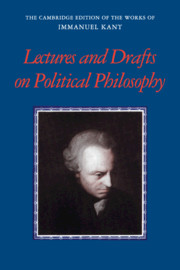Book contents
- Frontmatter
- Contents
- General Editors’ Preface
- Acknowledgments
- General Introduction
- Translators’ Remarks
- Reflections on the Philosophy of Right
- Natural Right Course Lecture Notes by Feyerabend
- Drafts for Published Works
- Drafts for Theory and Practice
- Drafts for Towards Perpetual Peace
- Drafts for the Metaphysics of Morals
- Drafts for Conflict of the Faculties
- Glossary
- Topical and Chronological Concordance
- Editorial Notes
- Index
Editor’s Introduction
Published online by Cambridge University Press: 10 December 2020
- Frontmatter
- Contents
- General Editors’ Preface
- Acknowledgments
- General Introduction
- Translators’ Remarks
- Reflections on the Philosophy of Right
- Natural Right Course Lecture Notes by Feyerabend
- Drafts for Published Works
- Drafts for Theory and Practice
- Drafts for Towards Perpetual Peace
- Drafts for the Metaphysics of Morals
- Drafts for Conflict of the Faculties
- Glossary
- Topical and Chronological Concordance
- Editorial Notes
- Index
Summary
Kant had long held that rebellion against any state, even a tyrannical one, was wrong, as evidenced from his course lecture notes reaching back into the 1770s. He argued in 1784 in “Idea for a universal history with a cosmopolitan aim” that any move from a worse state to a better would come about through indirect means rather than direct force. He believed that human history was moving toward a state that maximized and protected the freedom of each citizen yet thought that such progress depended on unintentionally progressive, self-interested acts of sovereigns trying to sustain and increase their external power rather than on any conscious acts of the citizenry directly intending to realize political ideals. He did argue that individual citizens ought to be able to call publicly for progress in the essay “What is Enlightenment?,” but still insisted that citizens are allowed only to attempt to persuade the sovereign and must always still obey the laws.
The outbreak of the French Revolution and its Declaration of the Rights of Man in 1789 would appear to have challenged Kant's position, since direct action aimed at increasing citizens’ rights led to the deposing of the French sovereign and to a state much closer to Kant's ideals. Kant privately praised the French Revolution and must have worked through its effect on his position but was reluctant to enter into the public debate about its legitimacy. When the publisher Johann Carl Spener suggested in March 1793 that Kant revise his “Idea” essay by discussing “the present circumstances” (11:415–16), Kant declined, citing both despair at having any influence over political actors and a desire to save his own skin (11:417).
Something changed Kant's mind.Within a few months he began draft work discussing the relation between the principles of a just society and the legitimate means for realizing them. He avoided direct reference to the “present circumstances” while nonetheless working through the question of when and how philosophical principles of right can be applied to actual states. This material became the second part of “Theory and Practice.”
- Type
- Chapter
- Information
- Kant: Lectures and Drafts on Political Philosophy , pp. 189 - 190Publisher: Cambridge University PressPrint publication year: 2016

